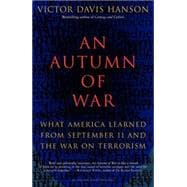
| Chronology of Events | |
| Introduction: Why September 11 Won't Go Away | |
| September | |
| What Are We Made Of? | p. 3 |
| Western Nations Are Slow to Anger, but Lethal in Their Fury | p. 6 |
| Cornered | p. 9 |
| Great Leaders Are Forged in War | p. 11 |
| War Myths | p. 15 |
| Pseudo-Military History | p. 19 |
| General Sherman, the Western Way of War, and September 11 | p. 24 |
| What if? | p. 38 |
| What Would Churchill Say? | p. 43 |
| October | |
| On Gorgons and Furies | p. 49 |
| Cognitive Dissonance | p. 53 |
| What Made Them Do Their Duty? | p. 57 |
| Tragedy or Therapy? | p. 64 |
| War on All Fronts | p. 69 |
| Truth and Consequences | p. 75 |
| The Time Machine | p. 79 |
| If This Be War | p. 86 |
| Class War | p. 92 |
| Ripples of Battle | p. 96 |
| November | |
| War Talk | p. 103 |
| The Dogs of War | p. 112 |
| Heads, They Win | p. 118 |
| More an Okinawa Than a Vietnam? | p. 123 |
| Five Not-So-Easy Pieces | p. 127 |
| They're Back! | p. 132 |
| The Time Is Now | p. 138 |
| A Voice from the Past | p. 145 |
| The More Things Change | p. 154 |
| December | |
| Questions Not Asked | p. 163 |
| Dates in Infamy | p. 168 |
| The Pied Piper of Tora Bora | p. 173 |
| Our Jurassic Park | p. 178 |
| Odd Couple Out | p. 184 |
| Pillars of Ignorance | p. 189 |
| The Iron Veil | p. 200 |
| Glad We Are Not Fighting Ourselves | p. 204 |
| It Really Is Your Father's Europe | p. 208 |
| Winners and Losers | p. 214 |
| Table of Contents provided by Blackwell. All Rights Reserved. |
The New copy of this book will include any supplemental materials advertised. Please check the title of the book to determine if it should include any access cards, study guides, lab manuals, CDs, etc.
The Used, Rental and eBook copies of this book are not guaranteed to include any supplemental materials. Typically, only the book itself is included. This is true even if the title states it includes any access cards, study guides, lab manuals, CDs, etc.
Excerpted from An Autumn of War: What America Learned from September 11 and the War on Terrorism by Victor Davis Hanson
All rights reserved by the original copyright owners. Excerpts are provided for display purposes only and may not be reproduced, reprinted or distributed without the written permission of the publisher.